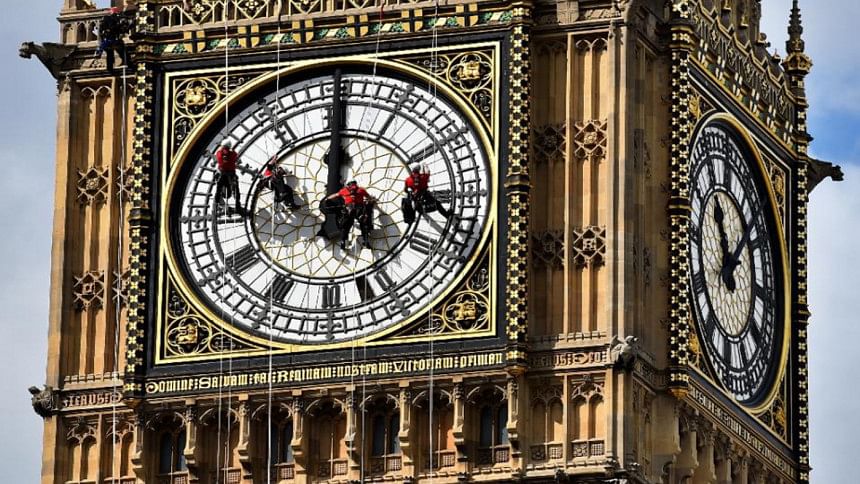Mice, smog and MPs: UK parliament faces urgent repairs

Behind the neo-Gothic splendour, Britain's Houses of Parliament is crumbling and overrun with mice, prompting its top official to warn the building may have to be "abandoned" without urgent renovations.
Leaking roofs mean members of parliament have to use waste paper baskets to catch drips when it rains and the ornate stonework has been eroded by air pollution.
Asbestos is a constant hazard and even the famous clock tower snapped by tourists from around the world leans 46 centimetres (18 inches) off the vertical.
Then there are the mice.
Rodents are frequently spotted scurrying around the members' tea room and a mouse hotline was even set up so politicians could report sightings.
One lawmaker, Anne McIntosh -- who has also seen mice in the House of Commons library late at night -- wants parliament to adopt a cat from a nearby animal shelter to chase them away.
"For some reason, my idea of having a cat wasn't accepted," McIntosh told AFP. "There are also reported to be rats -- it's so close to the river and they say you're never more than six yards away from a rat in London."
Also on the list of MPs' complaints are often cramped working areas and faulty heating.
£3 billion bill
Commons Speaker John Bercow flagged up the scale of the problems in a speech Tuesday, saying the final bill for repairs could be £3 billion (4.2 billion euros, $4.5 billion).
He warned that lawmakers could have to move out of parliament for good within 20 years unless major renovations take place in the next decade.
The Houses of Parliament, designed by Charles Barry and Augustus Pugin, was finished in 1870 and is now a UNESCO World Heritage Site.
Although a fire in 1834 destroyed most of the old Palace of Westminster and parts of the Commons had to be rebuilt after World War II due to bomb damage, there are still some areas which date back to the 11th century.
Despite such an illustrious history, the building faces an uncertain future.
Parliamentary authorities have commissioned a group of experts to tell them what exactly needs to be done and how much it will cost.
It is thought work is unlikely to start before 2021 and could take from several years to up to a decade, depending on how it is conducted.
John Thurso, a lawmaker who sits on the House of Commons Commission which oversees maintenance of the Palace of Westminster, said the work had been put off for too long and was now at a critical point.
"There will come a moment when something major will happen -- it could be the collapse of a bit of the building, it could be a fire -- any range of serious, catastrophic events," he told AFP.
"We have reached the point where, in pass the parcel terms, the music has stopped and it has to be dealt with."
'Bad public odour'
MPs are already talking about whether they should move out of the Palace of Westminster while the works take place or stay, even though this could significantly increase the bill.
Many are lobbying for parliament to move to their own constituencies for the duration of the works to address claims that British politics is too London-centric.
It is thought more likely that lawmakers would relocate to a nearby spot such as the Queen Elizabeth II Conference Centre, an unglamorous 1980s venue a stone's throw from parliament.
Whatever happens, the British taxpayer will have to foot the huge bill for renovations at a time when many are disillusioned with politicians after a string of scandals, including over MPs taking second jobs and submitting improper expense claims.
Some commentators suggest that the authorities should use the crisis to restore both the Palace of Westminster and politicians' crumbling reputations by creating a parliament more suited to the 21st century.
"Parliament has often been in bad public odour but its unfitness for purpose today is glaring," Simon Jenkins wrote in the Guardian newspaper this week.
"(It) should become a modern estate of the realm, standing effective against the executive, not its poodle."

 For all latest news, follow The Daily Star's Google News channel.
For all latest news, follow The Daily Star's Google News channel. 



Comments